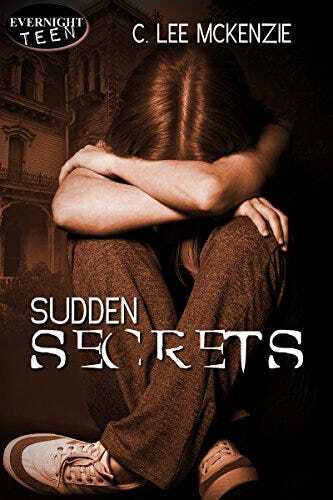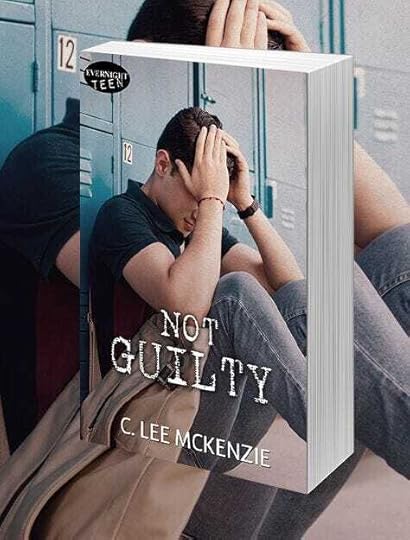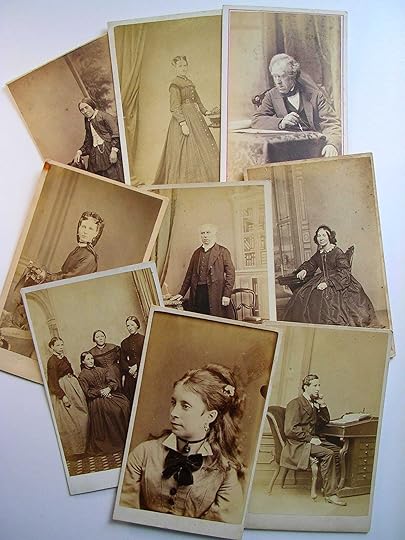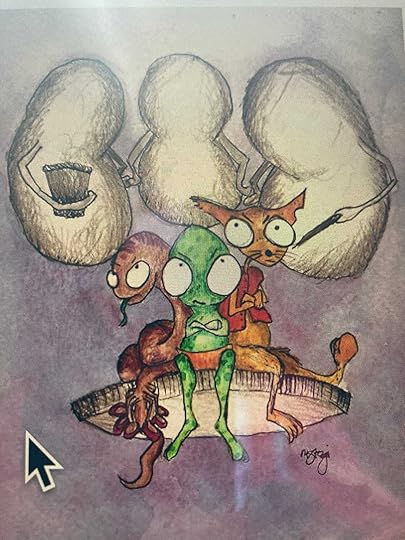C. Lee McKenzie's Blog, page 3
May 14, 2025
Heartless
Dear Readers,
I finally took the time to work on my Substack layout. I found that using my logo at the head of each post gives me a terrible static page. I’ll change that starting this week with Part 4 of Heartless. So far, all we know is that young girls are missing( Part 1), and another young girl might become the next victim (Part 2). In Part 3, we meet a young man with a bad reputation who arrives uninvited at this girl’s house, but her mother is alert and protects her from his advances. There’s a planned outing with the girl, her mother, and a new friend, Mrs. Kent. In the meantime, the police have their first clue. And now….
 Heartless, Part 4
Heartless, Part 4October 8, 1871
The Glenford-Leigh Estate
Miller placed a small envelope next to Mrs. Glenford’s breakfast plate.
She read the short note from her solicitor. I must see you on a matter of great importance. May I call at about eleven today? Hector Bromley, Esq.
“Oh, dear.” She looked across at Giselle. “I won’t be able to go with you after all. The solicitor has something he needs to see me about.”
“I can cancel. We can go another day,” Giselle said.
“No. You need an outing. I insist you enjoy time with Mrs. Kent and bring me back reports of that lovely hotel.”
At ten, Mrs. Kent’s carriage arrived for Giselle. Mrs. Glenford dressed to meet Mr. Bromley, then sat in the parlor reading. For a time, she lost herself in Louisa May Alcott’s newest fiction, but looked out the window with irritation when Mr. Bromley hadn’t arrived by ten past eleven.
“Tiresome,” she murmured, taking up her book again and settling in. At the sound of the bell, she huffed and rose to meet her solicitor. When Miller opened the parlor door, it was Mr. Grayson, and the hall clock was chiming twelve.
“Mr. Grayson?”
“I’m sorry, Mrs. Glenford, but I was hoping you could give me a moment of your time.”
She stepped aside and let him enter. Before closing the door, she said to Miller, “Send a boy to Mr. Bromley and ask why he hasn’t come.”
“Yes, Madam.”
As she turned her attention to her guest, he spoke quickly. “I won’t stay but briefly. I’ve come to ask your permission to court your daughter.”
Mrs. Glenford sank into her chair. She wasn’t able to reply.
“My reputation has been sullied by baseless rumors and nothing more. I would like an opportunity to show you and your daughter that my character is beyond reproach.”
This was the last thing she’d expected, but she noted the sincerity in his voice and attitude, so she couldn’t dismiss him out of hand. She rose once the initial shock had eased, and she leveled her gaze on him. “I will give your request some thought, sir.”
Grayson’s expression troubled her. She couldn’t decipher if it was gratitude or self-satisfaction. She would give his request some thought, but when her solicitor arrived, she would most definitely have the man investigated. Thoroughly.

Police Headquarters
What do you see in these pictures?” Detective Scofield turned the four images to face Sergeant Hawkins.
“Very pretty young ladies, sir. All very similar in face and stature.”
“Their dresses. Look at them.”
“Sorry, sir. I’m not much…but they do look alike with the roses and all.”
“Exactly.” The detective grabbed his hat and cloak. “Let’s find us a seamstress.”
They visited each of the families of the missing girls. And in each case, the same seamstress had made their daughter’s dresses. Once they had the address, they drove to the location.
A little after five, they entered a cramped shop. A woman straightened from her task and turned dim eyes in their direction. With arthritic fingers, she removed pins from her mouth and stepped away from the dress dummy. It was draped in a ball gown, and they’d interrupted her as she pinned roses around the neckline.
The detective showed his credentials and then produced the pictures of the missing girls. “Do you know these girls?”
She peered through spectacles set at the end of her nose, then, looking up, said, “Yes. And their gowns. I made them. Each young lady had a special occasion, you see.”
Hawkins gave his detective a slight nod of respect.
“How did these girls come to you to make their gowns?” Detective Scofield asked. “There are many seamstresses in this area of Chicago.”
“A lady has taken an interest in my work. She brings clients to my shop.”
“And her name?”
“Elizabeth Kent.”
Hawkins wrote down the address, and with the only lead they had in this case, they hurried across town.
And there you have it. Next week, Part 5.

You can buy all my books on Amazon.
A Weekly Dose of Fiction is a reader-supported publication. To receive new posts and support my work, consider becoming a free or paid subscriber.
May 7, 2025
A Weekly Dose of Fiction
Dear Readers,
Well, it’s time for Part 3 of Heartless. Part 1, introduces the diabolical character and the mystery. Part 2 hints at yet another young girl becoming a victim. Let’s see what happens next. And because it’s the First Wednesday of the month, I’m answering #IWSG’s question. Here we go!
 Part 3The Glenford-Leigh Estate
Part 3The Glenford-Leigh EstateMiller entered the sitting room where the Glenford women were having tea with Mrs. Kent. “Madam.” He held out the small silver tray with a calling card.
Mrs. Glenford took the card and immediately excused herself. Following Miller into the foyer, she greeted Mr. Grayson with a stiff nod. “What a pleasant surprise, Mr. Grayson. Did you forget something last night?”
“No. Not at all. I simply wanted to express my appreciation for your gracious hospitality.” He took her extended hand and brought it near his lips.
The door to the sitting room opened, and Giselle peered out. “Oh, Mr. Grayson.” She smiled and came to stand at her mother’s side. “I didn’t know Mama had asked you to tea.”
“I’m very sorry. I’ve come at a bad time,” he said.
Before Mrs. Glenford could speak, Giselle stepped back and held open the sitting room door. “Not in the least. Please stay. Mrs. Kent is here as well. You remember her from last night.”
Mrs. Glenford clenched her hands, but looking toward the butler, said, “Another setting, Miller.”
The hour passed with talk of the coming holiday season, and Mrs. Glenford kept her eyes on the intruder. It was clear that Giselle favored him. What was a mother to do? A trip to the continent would be perfect to distract her daughter, but that was out of the question this time of year. She needed time to plan for the Thanksgiving and Christmas parties. Mrs. Kent, bless her, guided Mr. Grayson’s attention away from Giselle each time there was a lull and her daughter’s eyes rested on that detestable face of his. How unfortunate he was handsome and well-spoken, his manners impeccable. Mrs. Glenford was at a loss for how to manage this situation. It was times like these she regretted even more that her dear George had fallen under that carriage.
After Mr. Grayson left, she and Giselle saw Mrs. Kent to the door.
“So it is all arranged,” Mrs. Kent said. “I shall send my carriage for Giselle about ten tomorrow. We are to have a day of it. We’ll see my seamstress to give her some new ideas, and then we’re off to the Palmer House. I hear it serves a splendid lunch.”
“Mama, you must come as well,” Giselle pleaded.
Mrs. Glenford had been so preoccupied by her concern with Mr. Grayson that she’d missed the plans for an outing. “Of course. I do want to visit our newest hotel.” She smiled at Mrs. Kent. “Ten o’clock it is.”
#
Police HeadquartersHawkins waited until Detective Scofield read the latest report.
“This is all that you’ve found?” the detective asked, holding out the paper.
“About the girl, yes, sir. She’s not related to the others, nor they to each other, but they are all of about the same age and physical description. Each of the young ladies appeared in the society columns within the last year.” He shifted from one foot to another. “I got replies from two police departments that I telegraphed about similar cases.”
“And?”
“Nothing solid, but last year, Philadelphia had some society girls vanish. They never found them. Then, something almost the same happened in New Orleans. Neither of them had much to tell me, other than they had never solved the cases.”
The detective waved him away and sat at his desk. He needed to think, and he did that better alone. He took out the images of the four missing girls and set them on the desk. All of them were close to his own daughter’s age, and that sent his pulse racing. The thought of anything happening to his precious child infuriated him. He slammed his hand onto the desktop.
“Damn.”
Someone was kidnapping and, he rubbed his eyes now stinging with frustration, probably murdering young society ladies. The similarity in each disappearance was not coincidence. What was he missing?
He rose and paced, then halted by the window to look out at the busy street. Carriages and bicycles. Vendors. A newsboy. Across the street a dressmaker’s shop.
“Dresses,” he said, fogging a spot on the window. He returned to his desk and picked up one of the images, then the other three. “Hawkins! Come in here.”
It seems there might be a clue at last. Part 4 next Wednesday. And now for The Insecure Writers’ Support Group question of the month. You can read it below or visit our WEBSITE.

The awesome co-hosts for the May 7 posting of the IWSG are Feather Stone, Janet Alcorn, Rebecca Douglass, Jemima Pett, and Pat Garcia!
Every month, we announce a question that members can answer in their IWSG post. These questions may prompt you to share advice, insight, a personal experience or story. Include your answer to the question in your IWSG post or let it inspire your post if you are struggling with something to say.
Remember, the question is optional!
May 7 question - Some common fears writers share are rejection, failure, success, and lack of talent or ability. What are your greatest fears as a writer? How do you manage them?
You can read my answer HERE!
I don’t mention this book very often, but it has been well reviewed, and I liked the mystery element. One reviewer says: Sudden Secrets is different from the fantasy and thriller novels I am usually drawn to, but I zipped through this novel in three days. I just didn't want to stop. C. Lee Mckenzie's writing is incredible. I truly enjoyed this read!

If you like my writing, I hope you’ll take a look at my published books.
Amazon . B&N . Evernight Teen . Smashwords
A Weekly Dose of Fiction is a reader-supported publication. To receive new posts and support my work, consider becoming a free or paid subscriber.
April 30, 2025
Short Story Wednesday

Dear Readers,
Here we go again with more of this dark period piece. Part 1, introduced the villain and gave you a hint of what they were up to. Let’s see what Chicago, October 7, 1871 has to offer this week. Remember that while this tragic story takes place, there’s another tragedy only one day away. Tick-Tock.
Heartless, Part 2The Glenford-Leigh Estate
Mrs.Glenford-Leigh walked the length of the table. Flatware polished. Crystal gleaming.
“There is a spot on this napkin, Miller.” She pointed at the table, and the butler at her side plucked the offending napkin and replaced it with one from his other hand. “Otherwise, satisfactory.”
“Thank you, Madam.”
He held the door for her, and she swept into the foyer where her first guests had arrived. The chill October air fingered its way inside the marble-tiled room, sending the chandelier into nervous chittering. One of the most impressive houses on the street, she cherished it almost as much as the memory of her departed husband, whose fortune had provided it. This time of year, Chicago days cooled quickly, and the nights became frosty. Twenty guests were expected and on time. She held to the highest standards of punctuality.
It irritated her that Giselle hadn’t come down yet, and as she greeted her last guest, she and then glanced at the staircase, a prickle of irritation flushed her cheeks. The girl was forever late. How she could be her daughter was a mystery.
When Mrs. Glenford entered the high-ceilinged parlor, the fire flickered in welcome, and Miller had already served most of the guests sherry. The small crystal glasses glinted in the gas lights. Conversations with punctuations of polite laughter assured the hostess she’d once again had guests who would guarantee a successful dinner party.
She’d debated about Mr. Grayson. Rumors of his indiscretions made him the wildcard, but he was engaged in conversation with two of the gentlemen.
The Manfrieds approached. “Brilliant evening,” Mr. Manfried said. His wife, who seldom spoke because she had the brain of a gnat, nodded. The woman was a bore, but her husband supported charities, so including them was necessary.
“I’m delighted––” Mrs. Glenford began, when the door behind them opened and Giselle stepped through. Her sapphire-blue gown draped off her shoulders and accentuated her amazing gray eyes, her father’s one contribution. She’d gathered her blonde curls back from her heart-shaped face. Angelic. Even the women glanced her way, some with admiration, others with nostalgic longing for their faded beauty.
Mrs. Glenford did not like Mr. Grayson’s look in the least. He shifted his attention from his conversation, and while sipping from his glass, kept his eyes on Giselle.
The lecherous beast.
“So sorry, Mama,” Giselle said in a hushed voice. “It was my hair. Colleen could not manage it properly tonight.”
Her daughter’s tardy arrival no longer the prime concern, Mrs. Glenford excused herself from the Manfrieds and took Giselle by the arm. “I have someone you must meet,” she said, guiding her daughter across to the woman seated by the fire.
Widowed only three years ago, and by all reports wealthy, Mrs. Kent was a new arrival from Philadelphia. Mrs. Glenford hoped she would soon be a contributor to her favorite charity, the Orphan Asylum.
“Mrs. Kent. I’d like to introduce my daughter, Giselle.”
The woman clasped the young girl’s hand in hers. “Delighted. Such a lovely dress, my dear. You must tell me the name of your seamstress, and I will share mine with you.”
Giselle took the chair next to Mrs. Kent, and they fell into talk of fabrics and gowns. Mrs. Glenford walked directly across the room to head off Mr. Grayson, who was taking a first step in her daughter’s direction. He’d not come near Giselle tonight or any other night.
#
October 7, 1871
Journal Entry
Last night’s dinner party was worth the time I had to take away from my projects. I knew immediately that I must have Giselle Glenford. I couldn’t look away from her the entire evening. The drape of her elegant blue gown accentuated the supple curves of her body. The flash of her keen eyes, a soft pewter, and the sound of her laughter enchanted me. Of course, it was her face that fortified my resolve.
I must complete my current project, and I’ve already decided not to proceed with the other. A waste, yes, but she doesn’t hold the excitement that Giselle does.
I set to work early that morning, dressing Alexandra’s hair and slipping her into the green silk gown. The pink roses at her neckline set off her skin tone perfectly.
Pulling her arms through the sleeves, I detected a slight imperfection in the wax along the waistline. It would create a bulge under the silk. On closer inspection, I discovered more irregularities along her spine that needed smoothing. I’d have to do some remodeling. That’s exactly what I’d feared. I should never rush one of my projects.
I’d no sooner heated the water than the church clock tolled two. Mrs. Glenford-Leigh served tea in exactly one hour. I had to set aside my work to arrive on time for inclusion. I’m determined to make a good impression on that fussbudget of a woman, but mostly on her daughter.
Next Week, Part 3
This short story has a touch of one of my favorite themes, justice. In my book, Not Guilty, I take that theme on again.

Here’s what Not Guilty is about: A blood-smeared knife. One young man’s word against another. A lifetime dream crushed.
The evidence points to Devon Carlyle. He was there when it happened. Everyone knows he had it in for Renzo Costa. And Costa says Devon was the one. In the judge’s rap of a gavel, Devon’s found guilty of assault. The star of the Oceanside High basketball team loses his shot at the one thing he’s worked so hard for—the championship game, where college scouts could see how good he is.
Now he makes his great shots in Juvenile Hall with kids far different from those that have always been in his life.
Angry? Hell, yes.
He’s bent on finding who committed the crime. He’s bent on making them pay because he’s Not Guilty.
But can he prove it?
Thanks so much for reading. If you like what I write, I hope you’ll take a look at my published books and give them a read as well. My Author’s Page is HERE.
April 23, 2025
Short Story Wednesday

Dear Readers,
Here we go again with another short fiction, and this time I’m offering up a bit of horror. Heartless was a part of an anthology called A Stitch in Crime. I’ve done some small edits, but it’s the same story, told in seven parts.
The Great Chicago Fire of 1871 destroyed 300 lives, 18,000 buildings and left 100,000 residents homeless. It seemed a perfect backdrop for a thriller, so for this reason, I chose to set Heartless in this time and place. I was also interested in exploring the Victorian period with its strict social codes. How macabre it was to have someone carving up and creating wax figures from young girls in a time when an unmarried couple could not travel in a closed carriage together, and the word “leg” was not permissible in polite conversation.
I know some readers prefer the whole enchilada, but the truth is I need some time to work on other writing projects. I create my stories the old-fashioned, human way without AI.
HeartlessOctober 6, 1871
Journal Entry
A swath of pale pink paint across her cheekbones, and her face glowed with vitality. Her eyes glistened in the light of my workroom. As I write this, I roll my head to ease the strain across my shoulders. Months of intense labor, and still the final touches remain undone. I can’t believe I began a new project tonight as well. I didn’t plan to, but I couldn’t resist. She was unexpectedly accessible and a perfect match for my needs. So, despite being exhausted, I had to clean the knife before returning it to the tool chest, then wash every surface until all of the dark fluids drained into the hole at the center of the sloped floor. I hadn’t needed the metal pot tonight, so at least I didn’t have that to manage.
My last chore was checking the ice storage to ensure everything was in order there. I’m smiling just recalling that moment.
Tonight, I spent hours longer than I planned, and I would have been late to the dinner party if I hadn’t pulled myself away immediately. So very hard to do. When I’m not quite finished, I hate to leave.
With great reluctance, I drew a soft blanket around her shoulders. Before dousing the light and pulling the door behind me, I glanced back. I’m eager to dress her in the gown, and I must restore her hair straight away. It looks so alluring curled around the nape of her neck. I’ve named her Alexandra.
 Morguefile Image
Morguefile Image#
Police Headquarters
Detective Scofield paced in front of his desk. “Damn. Damn. Damn.”
Sergeant Hawkins, clutching papers behind his back, only blinked, but perspiration beaded along his upper lip.
“When did this report come in?” Scofield demanded.
“Last night, sir.”
The detective halted and faced the sergeant. “And nobody notified me.”
“You were not”—the sergeant cleared his throat—“on duty, sir.”
“Blast it, Hawkins. I made it clear to fetch me immediately when a new missing person report came in. Young girl. Kenwood area. How did I not make that clear?”
When the sergeant didn’t answer, Scofield waved off the next angry words ready at his lips. “Never mind. Too late. What do you have so far?”
The sergeant handed the papers over and stepped back, silent.
Scofield read and hummed under his breath the way he always did when he was riled and thinking. “The same time. Almost the same place. From this description, the vanished girl could be related to the others.” This time his voice was low and dangerous, and he flicked the paper with his finger. “Is she related?”
“Don’t know yet, sir.”
“Then go and find out!” The commissioner would have his head if another girl were lost, and he hadn’t determined what was happening to them.
Next week, Part 2
I like to write a bit of horror once in a while. Tantsa is a story that I’ve made free to readers. Just let me know if you’d like to read it, and I’ll send you a PDF.

April 16, 2025
Short Story Wednesday

Dear Readers,
Welcome once again to A Weekly Dose of Fiction. This time, you get the entire story in one post. It’s a short and very new piece, so if it develops into a longer tale, there will probably be edits to follow. I hope you enjoy it.
Chez PhillipeWhat a day. The three-million-dollar house sale fell through, so there went my shot at a nomination for the Women of Influence Award, my commission, and my summer vacation. I was still reeling from that when Sophia called. My sister never contacted me with cheerful news; this was no exception. She was leaving for an extended cruise and renting the house, so Dad could no longer live with her. It was my turn again.
I love my dad, but he comes with complications, like he can’t remember who I am most days. And then there’s Aggie, his caregiver with severe rules, and Rudolph, Dad’s Schnauzer. Rudolph has memory issues of his own. I have to remember when he needs to pee.
After canceling my lobotomy, I decided to treat myself to a real dinner and skip the takeout boxes at least one night. A French restaurant opened in my neighborhood last month, and every time I pass their window, it’s full, so it has to be good.
“Madame.” The maître d anticipates my entrance and sweeps open the door. I already feel special. “Table for one?” He asks.
I hate to think how he guessed I’d be dining alone. A glance in the mirror behind the reception desk doesn’t help bolster my spirits. There’s a tight look around my eyes and mouth, the signs of the perpetually unwed that I remember from Great Aunt Lucia.
He gestures for me to follow and glides ahead. “Will this do?”
I nod and take the chair he pulls out.
“Henri will be your server tonight.” He tucks me neatly up to the table and snaps his fingers.
Henri magically appears with a crystal pitcher and fills my water glass. “Tonight’s special is the Ragout of Lamb. I suggest a pinot and the escarole salad.”
I glance at the menu and have a small heart seizure. Monsieur Phillipe must have a sizable mortgage and some unpaid credit card debt. The prices are double what I’m used to paying for a dinner out. The ragout is in the mid-price range, and I might get two meals out of it, making tonight’s splurge more reasonable.
I order it, say to hell with my budget, and take Henri’s suggestion for the wine and salad. Next week, I’ll have Dad, his daytime caregiver, and Rudolph in my apartment. This is my farewell to living on my solo schedule, but not the farewell I’d planned.
Once upon a time, I thought I’d be married by now. He was supposed to be a lawyer, maybe a doctor or a CEO was also acceptable. I’d have my house in the Hamptons or Key West. I’d consider San Diego. But I was now thirty-eight and the lawyer, doctor, and CEO had come and gone.
I sit back and sip the pinot. I figure each taste is about ten dollars, so I plan to savor every one. When the salad comes, I nibble on the prickly but tender greens, taking my time. It’s a small portion, but delicious.
“Your ragout, Madame.” Henri sweeps in, removes my empty salad plate, and sets the smallest portion of stew I’ve ever seen in front of me. I’ll have this gone in three bites.
I look up at the waiter, but he doesn’t seem to notice that the forty-two-dollar dish is about the size of a teacup. I must register disbelief in my expression because he gives me a Gallic shrug and leaves.
I’m not one to create scenes. I hate people who do, so I suck it up and spoon a mouthful of lamb and vegetables into my mouth. Not bad, but a little cool in the center. So now, not only is this overpriced and pitifully small, it’s not hot. I wave to catch Henri’s attention, and after ignoring me twice, he finally arrives at my table.
‘“Madame?”
“This isn’t hot.”
“No? I will see that it is.” And he’s off, carrying my plate and ramekin as if it were the queen’s crown.
No one has noticed my complaint, and I’m grateful. All I want to do now is eat and leave, never to enter Chez Phillipe’s again.
When the kitchen door opens, I expect Henri with my ragout; instead, a man the size of a Wolf range fills the doorway, his hands braced against each side of the jamb. His chef’s hat touches the top, and the neatly buttoned white apron expands and contracts across his heaving chest. He’s glaring at me. His nostrils are flared. All I see is a large white bull about to charge.
I’d run except I’ve frozen into inaction—a novice matador facing an experienced adversary.
In a very few long strides, he’s at my table, quivering with what I’m guessing is controlled rage. His chef’s hat quivers like a tall jelly. “You do not like the ragout.”
He hasn’t asked. He’s told me.
“No. That wasn’t why I sent it back. It just wasn’t hot enough.” I want to add that the portion would be suitable for a doll party, but I’m not by nature a brave woman. I come down more on the practical—do what you must do to survive—side.
“Come.” He pulls out my chair with a vigorous tug and helps me up, more like lifts me by the arm. His grip is firm, but not painful, and I don’t fear for my life. There are twenty pairs of eyes on us. I have witnesses.
In the kitchen, he removes the lid from a simmering pot. “Hot,” he says. “No one complains but you.”
I spy my minuscule serving next to the stove, dip a spoon into it, and hold it out for him to taste.
He does, then with a slow, deliberate swipe of his mouth, sweeps his hat off and bows. “I stand corrected, Mademoiselle.”
Mademoiselle. Hmm. “Well, then...all right.” It’s impossible to stay upset when confronted with an apologetic bull who also, now that I’ve calmed down enough to notice, happens to be stunning in a pugilistic way.
He escorts me back to my seat, personally serves the ragout--hot this time--and then tears up the check Henri has in preparation for my departure.
“May I know your name, Mademoiselle?”
“Ma..Ma..Madeline.” It takes a couple of false starts to get that out. I feel as if I’m seventeen and on the verge of a prom date.
“Phillipe Moreau.” He kisses my hand. “You will dine with me Monday, s’il vouz plaît?”
I don’t reply--speechlessness brought on my heart palpitations.
“Coq au vin. It will be delicious and hot when served.”
“Uh. I guess.” I’m more articulate if I’m not nervous.
“Here. Six o’clock.”
I’m able to nod, able to find the door, and walk to my apartment. I think I have a date. That’s something I haven’t had in three years. I unlock my door, humming. Mademoiselle. That has such a lovely melody. But then Madame Moreau does as well.
The EndMy vision is that a lovely romance blossoms between Chef Phillipe and Madeline. His restaurant is a smashing success, and he likes Schnauzers and extended families.

The Princess of Las Pulgas was my second book, and this week it got a boost from a professional reviewer when he mentioned Princess as one of his top 20 favorite reads. Here’s how his original review in 2014 began:
I have a confession to make. I am NOT a 16-year old girl. And, yet, I absolutely loved C. Lee McKenzie's The Princess of Las Pulgas, which IS about a 16-year old girl. I have read and enjoyed several YA books in the past that had teenage female protagonists - Truly, Madly, Deadly by Hannah Jayne and Wyndano's Cloak by A.R. Silverberry (his was a fantasy to boot) come to mind. So I'm not a novice when it comes to YA's. You can add this one to my recommend list. It's absolutely terrific.
April 8, 2025
Short Story Wednesday

Dear Readers. Welcome back and thank you for sticking with me and my weekly short bits of fiction. This is The End of another story. Part 1 set up the rural town and introduced Lannie, my young protagonist. Part 2 introduced Glenna, the one noble lady in town, and the “interesting” Mrs. Leonard who just might have designs on Glenna’s husband, Herb. So what next? Let’s find out.
Part 3Glenna poured another glass of lemonade and Mrs. Leonard chattered about how devastatingly hot this summer was turning out as she dabbed a tissue down the V of her ruffled blouse. Glenna’s hair had come loose from her ears and looked like a wig set lopsided on the mannequin in La Mode’s Dress Shoppe down on the square. I guess I was staring because pretty soon Mrs. Leonard and Herb stopped talking and stared at Glenna, too. Without a pause, Glenna swept her hair behind her ears and handed Herb the lemonade.
My mother was right. Glenna didn’t look too good, but then to me, Mrs. Leonard didn’t neither, even if she was stirring up Herb to a considerable degree. ‘Course that spelled trouble. The same kind of trouble Colleen Simpson caused me last year when she came to school, her boobs all but popped out of her scoop-neck T. She sent Charlie Barnes into fits. From that time on he never asked me to the Friday dances. I wasn’t about to let that happen to Glenna. She was too old to get another husband and she was sterile besides.
I didn’t sleep that night until I had a plan I thought Glenna’d go along with. Something to get Marjorie Leonard back across the street where she belonged and me and Glenna out in the garden again. Glenna could be one stubborn woman. I’d have to be really clever—sneaky actually—to get her to cooperate.
The next morning I filled an A&P bag with a pair of Mom’s good hair cutting scissors, curlers, Avon Cover Up and blusher, a dark eyeliner and some of my eau de cologne. It smelled rosy and Glenna, I knew, liked roses a lot.
“Hi!” I tried my easy-going-come-to-visit voice, but it didn’t work. She could spot a phony a yard away.
“You come to fix my hair?”
“Got everything here.” I held up my A&P bag.
She led the way into the kitchen and plunked into a chair. “All right, fix away.”
“What happened?” I spun a circle to take in what I couldn't believe I was seeing. The house was spotless. The sink looked naked without a single dirty dish and I swear I could see my face in the linoleum.
“Herb likes a clean house.”
“It wasn’t never this clean.”
“How do you know? You been here every day?” She sounded snappy like a dog on a tight tether.
I shut up and evened her hair.
“I’m gonna give you some curls, okay? I expected all kinds of hell, but she shrugged and sat still while I rolled, combed and fluffed. Then without asking, I put on the makeup.
You brought perfume, I expect.” Her voice came out flat and tired sounding.
“Right here.” I pulled out the Eau de Rose.
She tipped the bottle over her finger, patted behind each ear and, without looking at me, hiked her skirt to put more between her knees. “How do I look?”
“Great.”
“I smell okay?”
“Rosy.”
She nodded and smiled, sort of like she did when bugs got to her Petunias.
“You got a dress?” I felt I might as well go all the way while she was prone to listening.
“It’s over there.” She pointed to the ironing board where a red cotton dress hung to the floor—clean, starched, and pressed.
“I gotta go, Glenna. See you tomorrow?”
“I’m going to town tomorrow, Lannie.”
“Oh, sure. Okay. . . later.” Now that was a puzzle. If Glenna went to town it was to the A&P and that never took her more than fifteen minutes.
It was a week before I got to Glenna’s again. School was about to start, and I was on my way to La Mode Dress Shoppe. Despite my resolve not to stoop to Colleen Simpson’s low level of behavior, I had in my mind to buy a scooped-neck blouse I’d seen in their window even if it took all my summer allowance.
When I got to Glenna’s, the flowers along the side of the house sagged, heads down to the ground—the tiredest-looking bunch of plants I’d ever seen. In the back, the Black-eyed Susans looked like they’d lost a fight. The whole garden slumped under the hot sun.
She’s sick. My first thought.
I knocked at the back door. Glenna stuck her head out. She’d been boutiqued. Her nails were hot pink and she smelled sweet all over like she’d been dipped in a tub of bubble bath. She didn’t have on her jeans or the red cotton dress from last week, but a polka-dotted blouse and full skirt cinched in tight at her middle.
“I’d ask you to come in, Lannie, but I’m on my way out. Herb’s got the afternoon off and we’re going to the movies.”
Well, darn her anyways. How could she do this to me? I watched her and Herb walk towards town, his arm around her waist, her leaning into him like she needed staking up. It was terrible what I was seeing—Glenna going over to the other side. She’d be playing canasta with Mom and her friends next.
I sat on the porch step while Glenna’s garden shriveled, and inside I felt just as droopy as her petunias laying their heads down along the brick walk.
It was a while in coming, but when it did it was like one of the pastor’s revelations. I suddenly saw how this life was chuck full of bad choices. Like when I was ten and Mom made me pick my own punishment for stealing the grapes at the A&P. I could get my legs switched with a peach tree limb or my butt whacked with Mom’s pearl-handled hairbrush. Now, tell me how do you choose between saving your legs or your butt?
I wondered if Glenna’d had the same kind of predicament. Stay herself, or keep Herb home where he ought to be.
I had some thinking to do about buying that scooped-necked blouse or keeping true to the girl I was, so I picked up the garden hose and flooded the Black-eyed Susans to give myself some time to cogitate. I heard the pastor use that last Sunday, and I thought it was very sophisticated sounding—a word someone who knows about how the world works should use.
The End.
Hope you enjoyed meeting Lannie. She’s been in my head for some time. I may have to find another story for her to live in.
Libby and Harley are two other girls who caught my heart and kept me up at night until I wrote them a story.
Here’s a quick summary of Shattered:Courage put Libby Brown into the final selection for the Olympics, but betrayal crushed her spine and her chance at the Gold. Now she has two choices, use her courage to put her life back together, or remain shattered forever.

April 2, 2025
Short Story Wednesday

Dear Readers,
As usual, I’m serving up another dose of fiction. Part 1 of The Choice came out last week. I’ve linked to it so if you’d like to see how this story started, you can. Since this is the first Wednesday of the month, I answer The Insecure Writers’ Support Group question and visit many long-time friends to read what they’ve written. If you’re a writer and want to interact with others who labor over stories, join us. We’re a great group.
The ChoicePart 2
Aunt Edna was the only lady who said nice things about Glenna, and that was because Glenna won her over. Nobody liked Aunt Edna’s gooseberry pie, ‘cause it always had white gritty bits in with the fruit. Mary Phillips told her to dissolve the cornstarch in juice, but Aunt Edna never seemed to get the hang of it. Well, one Sunday Glenna up and asked not just for seconds but for thirds. I figured it was because Glenna got tired of Aunt Edna always being teary after potlucks. That didn’t win Glenna any popularity either ’cause Aunt Edna baked more Sunday pies with gritty bits from then on.
“Come on in here, Lannie,” Glenna called from the back porch. “I got company inside.”
The company turned out to be Majorie Leonard from across the street. Mom said she was plump and perky—a little too perky for a widow. Sex on her mind, Mom said, but that was before she saw me leaning against the doorjamb minding my own business. She suddenly needed more nuts for the canasta ladies, and I had to go to the A&P for some.
“Afternoon, Lannie.” Mrs. Leonard was perky, all right. Her hair was done up neat with a bow at the back. She’d curled her lashes and drawn blue lines under her eyes to make them big. Her mouth drew up like a tidy pouch of tobacco while Glenna carried away the breakfast dishes and stacked them in a sink already full of pots and plates left to crust over.
“Afternoon, Mrs. Leonard.” I nodded and gathered up the newspapers and garden books on the other chairs for Glenna and me to have someplace to sit.
“Lemonade?” Glenna asked.
“That sounds very refreshing, doesn’t it, Lannie?” Mrs. Leonard said.
“Yes, ma’am.” I couldn’t figure why she was perched here in Glenna’s kitchen at 4:30 on a hot afternoon when she could be in her air-conditioned living room watching everybody’s favorite Soap. How was she going to have anything to say after church next Sunday?
We were pretty much out of conversation by 5:00. Glenna, who never said much anyway, filled the quiet by passing the last cream-centered chocolate cookie in its cellophane wrapper. I declined politely as I’d been taught, but Mrs. Leonard didn’t hesitate a second. She snapped up that orphan cookie and nibbled around the edge with her tiny teeth until it disappeared like all the others.
At 5:05—I was watching the clock trying to think how we could get rid of Mrs. Leonard so as Glenna and me could go back outside—the screen door slammed and in comes Herb.
“Afternoon, Herb,” Mrs. Leonard said. And now perky wasn’t enough to tell how she looked.
“Afternoon, ladies.” Herb’s one of those men who can smile like you think a handsome cat might.
Mrs. Leonard crossed her legs and made her top foot all pointy. I didn’t remember perfume before she twitched her legs, but right then the smell hooked my nose and swiveled me around in my seat. Herb’s face turned positively barnyard mouser.
Uh, oh. I see trouble brewing for Glenna and I’m sure Lannie does, too. Part 3 next Wednesday. And now for…

Purpose: To share and encourage. Writers can express doubts and concerns without fear of appearing foolish or weak. Those who have been through the fire can offer assistance and guidance. It’s a safe haven for insecure writers of all kinds!
Posting: The first Wednesday of every month is officially Insecure Writer’s Support Group day. Post your thoughts on your own blog. This group is all about connecting! Be sure to link to this page and display the badge in your post. And please be sure your avatar links back to your blog! Otherwise, when you leave a comment, people can't find you to comment back.
The awesome co-hosts for the April 2 are Jennifer Lane, L Diane Wolfe, Jenni Enzor, and Natalie Aguirre!
Remember, the question is optional!
What fantasy character would you like to fight, go on a quest with, or have a beer/glass of wine with?
I don’t read much adult fantasy, but I have written some for kids. My Adventures with Pete and Weasel series is all about impossible things happening to two twelve-year-old boys. If I could, I’d go on one their quests with them. They save the Ornofree swamp from destruction (Alligators Overhead), they close the time lock and save the world (The Great Time Lock Disaster), and they set history back on course in Some Very Messy Medieval Magic. They don’t do any of that easily or because of Pete’s talent as a wizard. It’s more despite all his bumbling and because Weasel sticks with him no matter what.

March 26, 2025
Short Story Wednesday

Dear Readers,
As you know, if you visit here on Wednesday, I post fiction—serialized or complete—depending on what writing I’ve accomplished during the week. Today’s short story, The Choice, takes place during summer in a small rural town where we step inside fourteen-year-old Lannie’s head and share her observations about the people in her life.
The ChoicePart 1
I’d never thought about Glenna being ugly, but that’s what my mother said Glenna was one day while she and Mary Phillips and Jane MacCauley were playing canasta on our front porch. My mother was an authority on ugly women. She worked at the Cut and Curl Hair Salon and turned them out one after the other Tuesday through Saturday.
Herb, on the other hand, my mother said, was a real nice-looking man. Clean and presentable even if he did work on greasy cars in the Ace Garage every day. How Glenna ever snagged him was beyond her.
“They never adopted, did they?” That was Mary Phillips. She always had a way of asking personal questions that stirred things up.
“Glenna adopt? What in the world would she do with a child?” My mom.
“Plant it and watch it grow would be my guess,” Jane (Sour Grapes) MacCauley said, laughing in that crow-like way she had that set every ear to ringing. She couldn’t grow ivy but, Glenna, no matter what old stick she’d push in the ground, it’d sprout and bloom.
Those ladies all thought Mrs. MacCauley’s joke was funny and had themselves a good chuckle. I left by the back door for Glenna’s.
Mary Phillips was wrong, you see. Glenna adopted me. Mom had her canasta parties and a job, so she was always busy in the summer when I had the most time to do nothing. I’d traipse on down to Glenna’s, dig in the dirt, drink lemonade, and eat box cookies under her apple tree while she fertilized and cultivated and yanked weeds from between the Black-eyed Susans. My first reader, as I recall, was the Burpee’s seed catalog, and I could spell Delphinium before I ever seen one. I’d growed up there, and, even if I was only fifteen come July, the best summer days still happened in Glenna’s garden.
 Morguefile
MorguefileWhen I come up the path, she was kneeling on a patch of ground she’d turned over fresh that morning. It was dark, still damp, and sharp-smelling of cow dung. She waved a welcome and bent to tamp a new plant into place. The back of her hair had been chopped an inch or so since I saw her yesterday.
“You went and cut your hair again.”
“Yes. How’s it look, Lannie? Even?”
“Not hardly, Glenna.”
“You can fix it later. Put the rest of these petunias in here and I’ll go get us a cold drink.”
Glenna was not a customer at the Cut and Curl. She’d hold up a mirror to the back and cut her hair with scissors she said had been her mother-in-law’s—the best seamstress in town. Glenna didn’t sew. She didn’t cut her hair good neither. Sometimes it would come out a lot longer on one side than the other, so she’d tuck it behind her ears which, the canasta ladies agreed, were big enough to hold back a horse's tail. I’d come over and even her up so I didn’t have to hear them sniping about her. If I couldn’t make it, Glenna didn’t mind. She’d scrunch a big-brimmed hat on her head and parade down the street like she’d just won first prize for something.
“About the only first prize Glenna’s ever gonna win is for sloppy housekeeping.” My mom and her friends always had something to say about Glenna, and none of it good.
Maybe it was Glenna’s fault. She never socialized right. Oh, she’d go to the church get-togethers, but then she’d take along her favorite box cookies. Those cookies were kind of disgraceful, I guess. Mom rolled her eyes to heaven, and Mary Phillips clicked her tongue like a nervous chicken. Glenna’d just stand around, quiet and look over the ladies' curly heads, a tall Delphinium moving slow in the wind, high above the snippy talk.
Part 2, Next Wednesday
Available on Amazon

March 19, 2025
Short Story Wednesday

Dear Readers,
Welcome to or welcome back to Short Story Wednesday. This week’s tale is different from my usual fare. Xyla2 was published in 2009 in a magazine called Stories for Children. I love writing for young readers almost as much as I love reading stories written for them. If a story is well told, I don’t care what market niche it occupies. I hope this one makes you laugh. We all need to do that a lot this year,
Xyla2I’m Ardo. I used to be a perfect turtle. I had this fabulously wrinkled neck and, my pals said, an adorable tail. My pace was adagio. If you don’t know, that means measured and slow. See? A perfect turtle.
Then one day, while I was on my warm flat rock sunning by my favorite pond, something with hard, steely fingers grabbed me. It slammed me into a dark box and zoomed away so fast I rolled up inside my shell like a tennis ball. When the thing lifted me out of the box, I was in a bright room, and these round, faceless pods with stainless steel skin hovered over me. I ducked inside my shell again.
“Xxuuuyt qgrt yyy!” One of the pods shouted.
“Nope. I’m not coming out.”
“Rwees nkot, Ardo.”
I didn’t care what they promised. I was not budging.
“Gwnok,” finally, one of them said in a coaxing voice.
I love Gwnok. On earth, it’s called a small delicious bug. I poked my head out and, sure enough, Gwnok. Maybe this place wouldn’t be so bad.
Big mistake.
They didn’t hurt me, but they embarrassed me a bit, and after I came out of my shell, I was not the same. My legs started to grow—not the front ones, just the two in the back. My adorable tail disappeared along with my shell. I was shocked. Turtles don’t look all that great de-shelled.
I discovered that the Podlings were from planet Xlya2. They were doing experiments—that word still makes me shudder—on earth animals. I explained I was a technically not an animal, but a turtle—tsyyxl in Podling.
“Get a horse or a cow, not me,” I said, but they wouldn’t listen.
Soon, I had the legs of a marathon runner. I was doing laps on planet Xlya2 for something—I never found out what—and then one day—I wasn’t alone.
Garron arrived first. He started as a sleek alley cat, but after some time with the Podlings, his body puffed up like a balloon. When they set him in a deep pool of water to see how long he’d float, he sank straight away. He tried to tell them cats weren’t designed to float, but they came up with another idea. Once he was fitted with a life vest, he’d float most of the day with his feet sticking up in the air.
“I hate this,” he’d yell, but the Podlings ignored him and kept making data entries on their digital clipboards.
Sylvanna arrived later. As a snake, she wasn’t bad, but boy, did she make a fuss when she sprouted not one, not two, but six feet. The Podlings gave her three pairs of pink shoes that sparkled, and she finally agreed to walk on a treadmill.

Art work, Melissa Zepeda, 2009
We all wanted to escape, and since I was the only Podling speaker—I’ve always been good at languages—Garron and Sylvanna sent me to the Podling conference room to plead our cases. I was about to go inside when I overheard something in Podling that froze my turtle heart. If we didn’t escape by the end of the Xyla2 new moon phase, we would never be able to return to our normal selves. The Podlings were about through with us. They were already discussing their next visit to earth to find other creatures to replace us. In Podling, creatures are called blxtto.
I backed away from the conference room entrance and ran as fast as my super ridiculously long legs would go. Garron and Sylvanna met me at the laboratory door.
“Ssso?” Sylvanna hadn’t lost her hissy voice. “What did they sssay?”
I shook my head. “They said vwot again.” I couldn’t tell her that in a few days she’d never be able to lose those feet and slither the way she used to, that she’d always be ahymtx here on this strange planet.
Garron waddled into his corner and sat staring at the walls.
“I’m going on ssstrike.” Sylvanna stomped into her sleeping area and did her best to coil, but her shoes got in the way.
“Strike?” I asked. “You mean I should refuse to be a running tsyyxl?”
From his corner Garron, shouted, “And I’m not going to be a floating—” He looked at me. “What am I?”
“You’re a qtyl.”
“And I’m not going to be a tread-milling hymtx any more either.” Two pairs of Sylvanna’s shoes flew across the room and landed on the floor as the Podlings arrived.
The three of us stuck together. We stretched out side-by-side on the hard floor and refused to move. The Podlings huddled around us.
“Xwwwop!”
“Trrfkdp!”
They were not happy, and they spoke so fast their voices became a loud whirred. It was hard to understand them.
“What did they sssay?” Sylvanna hissed.
“I’m not sure.” I wished the Podlings had faces. Sometimes, expressions help me understand foreign words..
Suddenly, all the Podlings were talking at the same time, and I only caught a few words I could repeat in front of Sylvanna.
Then the wall slid open, and the head Podling swooped in. “Ywxxop!”
We were in for it. I would have given a month of Gwnok if I’d had my shell to duck inside.
“Ardo.” The head Podling shouted my name. “Qxvoo dxyt.”
“Qxvoo dxyt?” I repeated, shocked.
The head Podling sped off, leaving us with the angry lab crew.
Garron nudged me. “What?”
“I think they’re letting us go. Something us about being too much trouble.”
And sure enough, a short time later, they whisked us into the transport tube.
Zoom, zoom, zoom.
Plunk.
Earth.
“Home, at last,” we cheered.
Once we arrived, the changes started slowly but then sped up. My tail reappeared, then my rear legs shrank. It felt so good when my shell settled on my back. Garron became sleek and sly again with great cat whiskers, and when Sylvanna lost the last of her feet, she did have a brief moment of regret. She had to give up her sparkly pink shoes.
When we said goodbye, we were a bit sad, but we promised to keep in touch, and if any Podlings showed up again, we would sound an alert.
So here I am by my pond, warming up my shell, waiting for the wrinkles in my neck to return. Life is good, and—excuse me, I see Gwnok, and I’m hungry.
~The End~
Full Kirkus Review: McKenzie pens a swampy middle-grade story full of humor, hauntings, quirky characters and a mystery that continues to develop to the very end…A short, fun story that will excite both young and old imaginations.
Available on Amazon

March 12, 2025
Short Story Wednesday

Hello again, dear readers. Here’s the end of another short story. This is the tenth one since I started the series on Substack. I’ve discovered that I can write under the pressure of a deadline, but I still get nervous because self-doubt is ever-present—Can I write the ending in time? Well, I do have an ending for this one, and it’s on time, so go away, Self-Doubt.
If you missed the previous installments, in Part 1, a ghost is playing havoc in Hazel’s library, and she’s determined to stop him. In Part 2, he lurks in the non-fiction section, pulling out books with titles like How to Craft A Short Story, and then he tears pages from a short story anthology. She grabs that book from his grasp, and…
Now…
The Rewrite, Part 3 & The EndThe ghost stood as still as a vapor can and stared at her. “That was rude.” While the voice was all about mist and particles, it was a strong man’s voice. He had opinions. Of that, Hazel was sure.
“Not as rude as you. You can’t tear pages from a library book!” She held out her hand. “Give me those.”
He shook his head. “These are mine.”
“Not likely. They belong to Angels Camp Public Library.”
“See here, young lady, I wrote this.” The ghost waved the loose pages in the air.
Hazel glanced at the book in her hand. The Collected Works of Mark Twain. She shifted her eyes back to him. “Who are you anyway?”
He pointed at the image on the cover. “That is me. Or who I used to be before this terrible and permanent affliction befell me.” He waved a hand over his transparent chest. It was unnerving to be able to see the back wall of the library while staring at a man’s shirt.
She opened the book to where several pages were missing. “So what is it you’re here to do? This is unacceptable!” A book with missing pages upset her terribly.
“It has come to my attention that my prose is out of date. I have a Pass to visit for a sufficient time to make modern at least one story.”
“That doesn’t seem right,” Hazel said. “Sort of like changing history.”
“Perhaps, but I intend rewriting this one about the jumping frog.”
“I can’t see the reason—”
“Listen to this.” He cleared his throat, then began to read. “‘In compliance with the request of a friend of mine, who wrote me from the East, I called on good-natured, garrulous old Simon Wheeler, and inquired after my friend’s friend, Leonidas W. Smiley, as requested to do, and I hereunto append the result.’” He looked up at her. “Well?”
“Hmm. Kind of high and mighty sounding,” Hazel said.
The ghost agreed with a grunt. “No one’s likely to read it written the way it is. Not in this century. The year was 1865 when I wrote that. Things have changed a bit in storytelling. I’m here to set this right, but I don’t have much time left on my Pass.”
Hazel considered the problem. Rita Baum would toss her and her mops right out the door if she found this book shredded. But that writer's ghost wasn’t about to budge. He was one stubborn haunt. She could tell by the way he held tight to those pages.
“Look here. How about I get you some paper and a pencil, so as you can do your rewriting, but you give me what you tore out. I’ll lose my job if you don’t.”
He hesitated, then handed what he held to Hazel. “I can’t be causing a loss of a paying position, but I’d appreciate it mightily if you’d give me that paper and pencil.”
He wrote for over an hour, then he gave her what he’d written. She tucked the new version into the book with the original pages she’d carefully taped back into place, then reshelved the book in exactly the right spot.
“I thank you kindly, “ the ghost said and, with a grand flourish, vanished.
Once she was alone, she opened The Collected Works of Mark Twain and took out the papers tucked inside. Curious, she sat and read the slanted strokes of the handwritten lines.
“‘A friend of mine wrote me from the East and asked me to visit old Simon Wheeler. My friend wanted to know what ever happened to a guy named Leonidas W. Smiley. When I found Wheeler, he had quite a tale to tell.’”
She turned her face to the ceiling, thinking Mr. Twain might hear her more clearly that way. “Not so highfalutin’ now. But I kind of enjoyed the old one.”
The End
One reviewer says: The narrative is gripping and holds your attention until the very end. The characters are endearing, relatable, and skillfully developed.
From the very first page, the story picks up pace, and the finale stays with you long after it's over. Available on AMAZON




